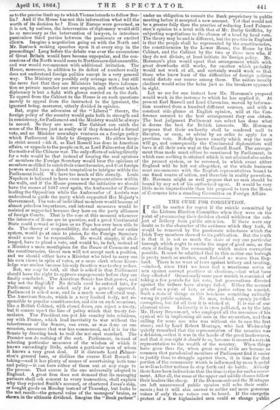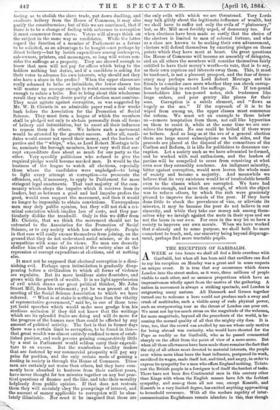THE CURE FOR CORRUPTION.
IT will be matter for regret if the suicide committed by the Lisburn Election Committee when they were on the point of pronouncing their decision should withdraw the sub- ject of Bribery from public attention. If there were any doubt as to the character of the evidence which they took, it would be removed by the passionate reluctance which the Irish Tory members showed to its .publication. But the truth is that it is not so much the state of any one particular borough which ought to excite the anger of good men, as the state of feeling in the community which makes corruption possible. It must be admitted that in this matter one borough is pretty much as another, and Ireland no worse than Eng- land. There is no want of laws against bribery and treating, —indeed, since 1841 we have had a wearisome series of acts against corrupt practices at elections,—but what have they effected ? Occasionally some poor wretch is convicted of taking a few pounds for his vote, but prosecutions directed against the bribers have always failed. Either the accused gets off on a point of law, or else juries refuse to convict. Such a state of things as this betokens something radically wrong in public opinion. No man, indeed, openly justifies corruption, but for all that it is winked at. It is one of our pleasant vices. Indirectly it is even palliated, as by the late Mr. Henry Drummond, who employed all the resources of his cynical wit in implicating all men in the accusation, and then calling for some one who was without sin to cast the first stone; and by Lord Robert Montagu, who last Wednesday quietly remarked that the representation of the counties was a delusion,—that it was in the hands of the great landowners, and that it was right it should be so, because it secured a certain representation to the wealth of the country. When things have gone thus far, when great moral evils are become so common that paradoxical members of Parliament find it easier to justify than to struggle against them, it is time for that portion of the community which is influenced by more hopeful as well as loftier notions to step forth and do battle. Already there have been indications that the time is ripe for such a move- ment. After all, the mass of the upper and middle classes follow their leaders like sheep. If the Drummonds and the Montagu. s are left unanswered public opinion will echo their sentt- ments ; but it will also answer to nobler and more generous voices if only those voices can be heard. If the energetic feeling as to abolish the slave trade, put down duelling, and eradicate bribery from the House of Commons, it may also purify the constituencies; but of this we are convinced, that if there is to be a change of feeling with reference to corruption it must commence from above. Voters will always think on the subject in the same way as candidates. While the latter regard the function of a member of Parliament as a favour to be solicited, as an advantage to be bought—not perhaps by direct bribery—but by lavish expenditure among innkeepers, cab-owners, printers, and messengers, so long will voters con- sider the suffrage as a property. They are shrewd enough to know that men will not pay for offices which bring to the holders nothing but duties, and if a candidate is asking for their votes to advance his own interests, why should not they also have a share in the profits ? When the upper classes are really ashamed to bribe or intimidate, the lower classes too will muster up courage enough to resist coercion and virtue enough to refuse a bribe. But to bring about this wholesome result they who really desire purity of election must combine. They must agitate against corruption, as was suggested by Mr. W. D. Christie in an admirable paper read a few weeks back before the Association for the Promotion of Social Science. They must form a league of which the members shall be pledged not only to abstain personally from all forms of bribery and intimidation, but to exert all their influence to repress them in others. We believe such a movement would be attended by the greatest success. After all, candi- dates would sooner not speed their money, and the leaders of parties and the " whips," who, as Lord Robert Montagu tells us, nominate the borough members, know very well that cor- rupt expenditure does about as much for one party as the other. Very speedily politicians who refused to give the required pledge would become marked men. It would be the business of the league to watch all elections, especially those where the candidates were unpledged—to bring to light every attempt at - corruption—to prosecute the offenders, and, if necessary, to apply to Parliament for more stringent legal enactments. That vast majority of the com- munity which obeys the impulse which it receives from its leaders, but as between a good and bad impulse prefers the good, would soon support the movement, and then it would no longer be impossible to obtain convictions. Unscrupulous men may defy public opinion, but they will not risk a cri- minal conviction which implies loss of caste, and they par- ticularly dislike the treadmill. Only in this we differ from Mr. Christie, that we think the movement should not be entrusted to the Association for the Promotion of Social Science, or to any society which has other objects. People in that case will easily excuse themselves from joining, on the ground that they do not understand social science, or do not sympathize with some of its views. No man can decently shelter him'elf under this pretext if the society aims at the repression of corrupt expenditure at elections, and at nothing else.
It must not be supposed that electoral corruption is a dimi- nishing evil. Perhaps open intimidation is gradually disap- pearing before a civilization to which all forms of violence are repulsive. But its more insidious sister flourishes, and grows with the growth of wealth. It is no light apprehension of evil which draws our great political thinker, Mr. John Stuart Mill, from his retirement ; yet he was present at the meeting of the Social Science Association to which we have referred. " What is at stake is nothing less than the vitality of representative government," said he, in one of those terse yet lucid speeches which would make mea grudge him his studious seclusion if they did not know that the writings which are its splendid fruits are doing and will do more for the progress of the human race than could be effected by any amount of political activity. The fact is that in former days there was a certain limit to corruption, to be found in this— that great wealth was almost entirely confined to men of estab- lished position, and such persons gaining comparatively little by a seat in Parliament would seldom carry their expendi- ture to an excess. But the numberless wealthy traders that are fostered by our commercial prosperity will pay any price for position, and the only certain mode of gaining a footing in society is through the House of Commons. These men are certainly not worse than others, but they have com- monly been absorbed in business from their earliest years, have never thought for ten minutes together on any but prac- tical questions of finance and the like, and take their morality helplessly from public opinion. If that does not restrain them they will certainly obey the promptings of interest, and the amount of money applicable to corruption will be abso- lutely illimitable. Nor must it be imagined that these are the only evils with which we are threatened. Tory Lords may talk glibly about the legitimate influence of wealth, but we shall have to suffer not only the evils of "plutocracy," but, as Mr. Mill most forcibly urged, of democracy too. For when elections have been made so costly that the choice of the electors is limited to men of colossal fortune, and who as a class are known to be seeking their own advancement, electors will defend themselves by exacting pledges on those points which they have most at heart. On great questions the House of Commons will become an assembly of delegates, and on all others the members will consider themselves fairly entitled to have their money's worth—to vote, that is to say, as, their own caprices and interests sway them. This, it must be confessed, is not a pleasant prospect, and the fear of demo- cracy may perhaps move Lord Robert Montagu and his friends to consider once more whether they can check corrup- tion by refusing to extend the suffrage. No. If ten-pound householders like ten-pound notes, rich tradesmen like large orders, and poor gentry like places for their sons. Corruption is a subtle element, and "flows as hugely as the sea." If the reproach of it is to be wiped from among us, the upper classes must commence the reform. We must set an example to those below us —remove temptation from them, not call like hypocrites on them. to resist it, while at the same time we are our- selves the tempters. No one could be bribed if there were no bribers. And so long as at the eve of a general election there are large secret subscriptions on both sides, and the proceeds are placed at the disposal of the committees of the Carlton and Reform, it is idle for politicians to denounce cor- ruption. Let a society such as we have advocated be formed, and be worked with real enthusiasm, and the leaders of parties will be compelled to cease from conniving at what even now they ostensibly condemn. An indignant minority, bitter against corruption, would soon leaven the whole mass of society and become a majority. And meanwhile we believe that its very existence would be of incalculable benefit even to the classes which are corrupted. We have had societies enough, and more than enough, of which the object was to reform others, by which the rich were graciously pleased to improve the morals of the poor. If they have done little to check the prevalence of vice, or alleviate its miseries, it may be because the poor do not believe in our sincerity, and while they take our money ask among them- selves why we inveigh against the mote in their eyes and see not the beam in our own. For once in the way let us have a society to improve our own morals. When we have worked that zealously and to some purpose, we shall both be more competent to teach, and, our sincerity being beyond disparage- ment, perhaps find more tractable pupils.































 Previous page
Previous page